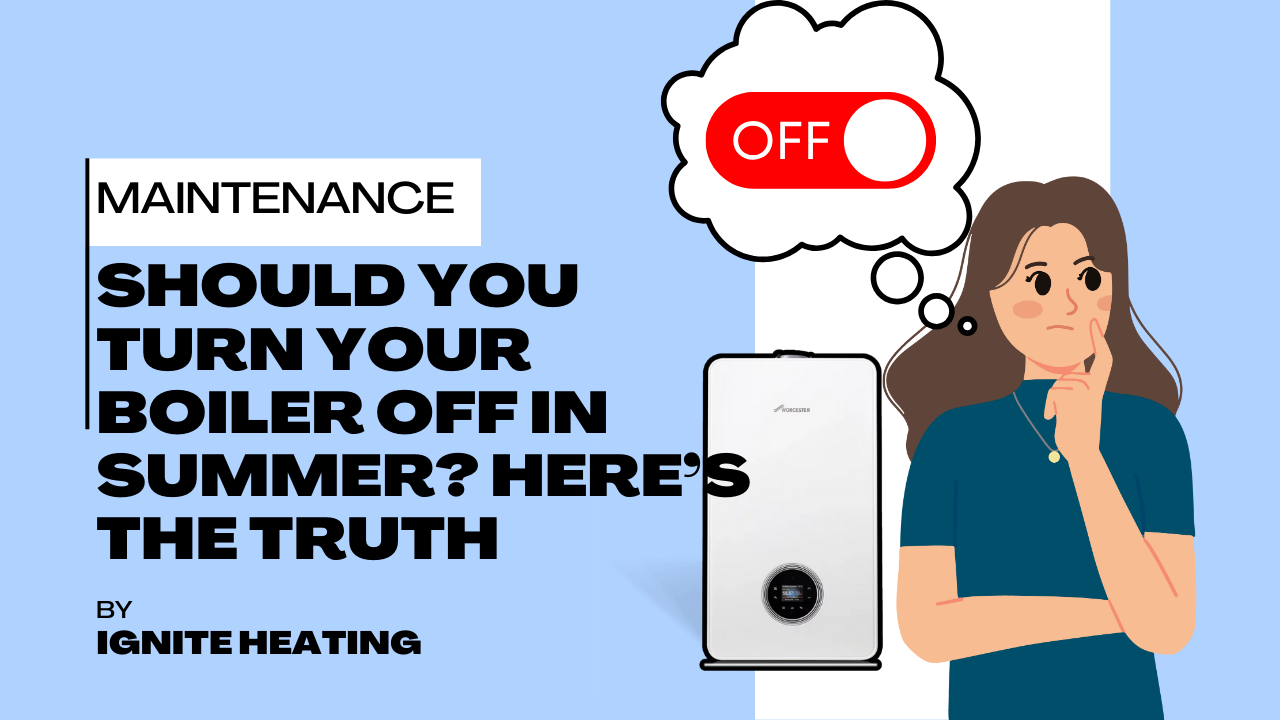
Should You Turn Your Boiler Off in Summer? Here’s the Truth.
Search Should You Turn Your Boiler Off in Summer? Here’s the Truth. Summer’s here finally. The sun’s shining (most days),

When your boiler starts acting up, it can be difficult to decide whether to repair it, service it, or replace it entirely. Many homeowners face this dilemma, unsure of the most cost-effective and efficient solution. In this guide, we’ll break down the key factors to help you make the right choice.
When your boiler suddenly stops working, makes strange noises, or fails to heat your home properly, a repair might seem like the most logical and immediate solution. After all, calling out a heating engineer to fix the issue is usually quicker and more affordable than replacing the entire system. In many cases, small faults such as low pressure, thermostat malfunctions, airlocks, or minor leaks can be resolved with a straightforward fix, restoring your boiler to working order without the need for a major investment.
However, not all boiler issues are as simple as they first appear. What might seem like a minor fault can sometimes be a symptom of a deeper, underlying problem. For example, a small leak could indicate corrosion inside the boiler, a faulty pump, or worn-out seals that may lead to bigger failures if left unaddressed. Similarly, if your boiler is losing pressure frequently, it could be due to a persistent leak in the system or a failing expansion vessel.
While repairs can offer a temporary fix, they aren’t always the best long-term solution—especially if your boiler is aging or breaking down repeatedly.

A repair is typically the right option in the following scenarios:
If your boiler meets these conditions, then a repair is likely the most practical and budget-friendly option. A professional heating engineer can diagnose the issue, carry out necessary fixes, and get your boiler running efficiently again.
While repairs can be a short-term fix, there are cases where they may not be the best investment. Here are some red flags that indicate a repair might not be the wisest choice:
While a one-off repair might seem like the most cost-effective solution, repeated breakdowns can quickly turn into a financial burden. The key is to assess whether your boiler is still a good investment or if ongoing repairs are just delaying the inevitable.
If your boiler is still relatively new, hasn’t had many issues, and the repair cost is low, then fixing it is likely the best option. However, if you’re frequently spending money on repairs, noticing higher energy bills, or dealing with an aging boiler, it may be time to consider a long-term solution—such as upgrading to a more reliable, energy-efficient model.
Would you like to explore how a boiler maintenance plan can help avoid unexpected repair costs? Keep reading to learn how regular servicing can extend your boiler’s lifespan and save you money in the long run. 🚀
Many homeowners only think about their boiler when something goes wrong. However, much like servicing a car, regular boiler maintenance is essential to keeping your heating system in top condition. A boiler service is often overlooked, yet it plays a crucial role in ensuring your boiler operates efficiently, safely, and reliably throughout the year.
During an annual boiler service, a Gas Safe registered engineer will conduct a series of checks to inspect, clean, and test your boiler. These routine inspections can identify minor issues before they escalate into costly repairs, saving you money and avoiding the inconvenience of a breakdown—especially in the colder months when you rely on your boiler the most.
A small investment in an annual service can have significant long-term benefits. Here’s why regular servicing should be a priority:
A professional service can detect early signs of wear and tear, helping to prevent breakdowns before they happen. Small issues, such as unusual sounds or minor leaks, may seem insignificant at first but can develop into major faults if left unchecked. For example, a blocked condensate trap can build up and eventually flood the boiler and result in a whole new boiler being needed, if not cleaned. Catching these problems early can prevent expensive emergency repairs.
A well-maintained boiler runs more efficiently, using less fuel to heat your home. Over time, dirt and debris can build up inside the system, reducing efficiency and forcing your boiler to work harder. Regular cleaning and servicing ensure that components like burners, heat exchangers, and flues are functioning optimally, keeping your heating bills as low as possible.
Many boiler manufacturers require an annual service as part of their warranty conditions. Failing to service your boiler each year may void your warranty, meaning you could end up covering the cost of any future repairs out of pocket. Keeping up with your servicing schedule ensures that you remain eligible for free repairs or replacements if a fault occurs.
A faulty boiler can pose serious safety risks, including gas leaks or carbon monoxide poisoning. Carbon monoxide is an invisible, odorless gas that can be fatal if undetected. A professional service includes checks for gas leaks and ensures your boiler is burning fuel safely, providing peace of mind that your home and family are protected.
Just like any piece of machinery, a boiler’s lifespan is significantly affected by how well it’s maintained. Without proper care, internal components can become worn & damaged, leading to inefficient operation, higher repair costs, and a shorter lifespan. A well-serviced boiler can last 15 years or more, whereas neglected systems may fail much sooner, requiring costly replacements.

A standard boiler service typically includes:
✔️ Visual inspection of the boiler and pipework
✔️ Checking for leaks, corrosion, or damage
✔️ Cleaning key components, such as the trap and heat exchanger
✔️ Testing flue emissions to ensure safe operation
✔️ Checking pressure levels and adjusting if necessary
✔️ Examining seals and gaskets for wear and tear
✔️ Ensuring the thermostat and controls are working correctly
Many people assume that if their boiler is still working, there’s no need for a service. However, waiting until a fault develops can be a costly mistake. Emergency repairs are often significantly more expensive than the cost of an annual service, especially if a breakdown happens outside normal working hours.
Furthermore, a failing boiler often works harder to produce heat, leading to higher energy bills while still providing subpar performance. Regular servicing not only prevents sudden breakdowns but also ensures your boiler is running as efficiently as possible, helping you save money in the long run.
There comes a point when repairing an old or faulty boiler becomes more trouble than it’s worth. While many homeowners try to extend the life of their boiler with repairs, there is a tipping point where replacement becomes the more cost-effective solution. Investing in a new, energy-efficient boiler may seem like a significant upfront expense, but it can save you money in the long run through lower energy bills, fewer repair costs, and improved heating efficiency.
Modern boilers are designed to be smarter, more efficient, and longer-lasting, meaning upgrading can bring significant benefits to your home’s heating system. If your boiler is struggling, here are some clear indicators that it may be time for a replacement.
If you find yourself constantly calling an engineer for repairs, it’s a clear sign your boiler is on its last legs. A one-off repair may be manageable, but when breakdowns start happening regularly, the costs can quickly add up.
If repair costs exceed 50% of the price of a new boiler, replacement is usually the smarter option.
A new boiler eliminates the stress and expense of continuous repairs, providing reliable heating and hot water without unexpected breakdowns.
Older boilers, especially those installed over 15 years ago, tend to lose efficiency and become more prone to faults. Even if it still functions, an aging boiler is unlikely to provide the same level of performance as a modern A-rated model.
Additionally, older boilers often lack the latest heating technology, such as smart thermostats and modulating burners, which help optimise energy use and reduce waste.
Most modern boilers operate at 90%+ efficiency, compared to older models that may only achieve 60-70% efficiency. That’s a significant amount of wasted energy—money that could be saved with an upgrade!
If your heating bills have increased despite normal usage, your boiler may be struggling to run efficiently. Older models have to work harder to produce the same level of heat, leading to higher energy consumption and costs.
To a modern, energy-efficient boiler can reduce heating costs by up to 30%, making it a wise long-term investment.
As boilers age, certain replacement parts become discontinued, making repairs more difficult and expensive. If your engineer struggles to find compatible parts for your boiler—or if the cost of spare parts is unusually high—it’s a strong indication that your boiler is outdated.
costly components include heat exchangers, circuit boards (PCBs), and pumps. If one of these fails, replacement costs can be nearly as expensive as a new boiler.
If you’re dealing with any of the issues above, switching to a modern A-rated condensing boiler is a worthwhile investment. Here’s why:
✅ Lower Energy Bills – Newer models are up to 90%+ efficient, meaning less fuel is wasted, and more heat is delivered to your home.
✅ Reliability & Fewer Repairs – A new boiler comes with a manufacturer’s warranty (often 7-10 years), ensuring peace of mind.
✅ Better Heating Control – Many modern boilers work with smart thermostats, allowing you to optimize heating schedules and reduce waste.
✅ Eco-Friendly – New boilers produce fewer carbon emissions, making them a greener choice.
The cost of a new boiler varies depending on the brand, model, and installation requirements. On average:
💰 Combi Boilers – £1,500 – £3,000 (including installation)
💰 System Boilers – £1,800 – £3,500 (including installation)
💰 Conventional Boilers – £2,000 – £4,000 (including installation)
While this may seem like a significant investment, consider this:
🔥 A new boiler can pay for itself in 5-7 years through lower energy bills and reduced repair costs.
🔥 With financing options and boiler care plans, the cost can be spread into manageable monthly payments.
If your boiler is still working efficiently and repairs are minimal, you may be able to extend its life with regular servicing. However, if you’re facing constant breakdowns, rising energy bills, or costly repairs, replacing your boiler is likely the smartest financial decision.
Get in touch today to discuss boiler replacement options, financing plans, and energy-efficient models that suit your home’s needs. A warm, worry-free winter starts with a reliable boiler! 🔥💨

Search Should You Turn Your Boiler Off in Summer? Here’s the Truth. Summer’s here finally. The sun’s shining (most days),

Search Should I Upgrade My Central Heating System Before Winter? Winter in the UK can be brutal, with freezing mornings,
© 2024 Ignite Heating. All rights reserved